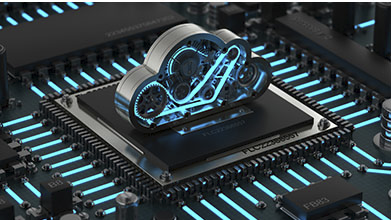Cloud native EDA tools & pre-optimized hardware platforms
Synopsys Cloud
Unlimited access to EDA software licenses on-demand
Do you work for a novel chip design startup or a small/medium-sized business that is considering moving its chip development to the cloud? In this article, we provide a cloud computing overview to help you decide whether the cloud is right for you.
Cloud computing refers to the on-demand availability of computing resources through the internet, providing scalable and elastic IT-enabled capabilities.
The cloud allows you to lower your operating costs, run your infrastructure more efficiently, and scale resources as your business-needs change.
Cloud Computing Deployment Types
There are three main cloud deployment types you can use for chip design and verification:
- Public clouds are operated and owned by third parties who provide computing resources, such as servers and storage, over the internet. Public cloud providers—including Amazon Web Services, Microsoft Azure, and Google Cloud—own and manage all hardware, software, and other infrastructure. You access and manage those services via your web browser.
- Private clouds are cloud computing resources used exclusively by one organization. The company's on-site data center can provide the physical location of a private cloud. Other companies use third-party providers. With private clouds, everything remains in a private network. A private cloud provides the benefits of a public cloud—self-service, scalability, and elasticity—but adds the benefits of control and customization. Furthermore, you will experience higher security and privacy since your data stays on private networks. Private clouds are implemented through specialized software, such as OpenStack, deployed as a layer above the data center hardware, and they almost always include virtualization.
- Hybrid clouds are a fusion of public and private clouds that share data and applications among themselves. Hybrid clouds let you move data and applications between private and public clouds, allowing you greater flexibility and more deployment options. They also optimize your existing infrastructure, security, and compliance. You can store confidential data and IP in the private cloud and place web servers and endpoints in the public cloud.

Cloud Computing Service Types
There are three main cloud service types you can use for chip design:
- SaaS (Software-as-a-Service) is excellent for startups and small businesses that lack the money or resources to manage their infrastructure. You can access a SaaS application anywhere and anytime via a web browser. Application scaling is easy, and data stores in the cloud. The provider handles software updates and maintenance.
- PaaS (Platform-as-a-Service) is a cloud computing platform that includes computing, memory, data storage, a database, and other app development services. With PaaS, there is no need for expensive hardware. PaaS providers instead supply customers with the latest software, hardware, and operating systems. Customers manage their own apps along with the data the apps need.
- IaaS (Infrastructure-as-a-Service) enables customers to pay only for the virtual infrastructure they need. The IaaS platform provides flexibility in hosting and storing custom-built apps or standard software. IaaS is beneficial for companies with heavy application workloads that want to offload the operations and maintenance involved in managing infrastructure.

Other cloud services not used as frequently as SaaS, PaaS, and IaaS include:
- FaaS (Function-as-a-service) provides a platform for developing, running, and managing applications. So developers don't have to build and maintain the infrastructure to launch their apps.
- Serverless cloud enables developers to build apps without maintaining servers and infrastructure constantly. You don't have to worry about setup, capacity planning, or server management.
The Benefits of Cloud Computing
There are many advantages to cloud computing, such as speed, efficiency, and dynamic scaling. Here is a brief overview of the main cloud computing benefits:
1. Scalability
With cloud computing, you can scale your business elastically. Scalability allows you to deliver the right amount of IT resources, such as computing power, storage, and bandwidth, right when you need them from the correct location.
2. Cost Savings
With cloud computing, you won't need to buy hardware and software. You won’t need to set up and run on-site data centers, either, lowering the cost of server racks, electricity for power and cooling, and IT experts.
3. Speed
You will be able to execute faster and deliver more value to your customers with cloud computing. With the help of cloud infrastructure, you can quickly set up virtual machines in the cloud. You can also experiment with ideas and automate the stages of testing and deployment.
4. Performance
Most cloud computing services reside in secure data centers worldwide. These centers are continually upgrading with faster and more efficient hardware. Compared to a single corporate data center, cloud computing offers several performance advantages, such as reduced network latency and economies of scale.
5. Reliability
Because data can be replicated at multiple redundant sites on the cloud provider's network, you can back up your data and recover from disaster more efficiently and cost-effectively when you rely on the cloud.
6. Security
Cloud providers have policies, technologies, and controls in place to strengthen your security posture, helping you protect your data, apps, and infrastructure. In addition, private hosting provides a firewalled infrastructure for increased security.
What Chip Designers Need to Know
With the cloud, you can scale chip design and verification capabilities on demand in a secure environment, no matter the size of your business. Not only can you take advantage of the most advanced computing and storage resources, but you can also reduce or eliminate your system maintenance costs. Plus, flexible usage models allow you to handle the bursts of peak usage that often occur in the chip design process.
Synopsys, EDA, and the Cloud
Synopsys is the industry’s largest provider of electronic design automation (EDA) technology used in the design and verification of semiconductor devices, or chips. With Synopsys Cloud, we’re taking EDA to new heights, combining the availability of advanced compute and storage infrastructure with unlimited access to EDA software licenses on-demand so you can focus on what you do best – designing chips, faster. Delivering cloud-native EDA tools and pre-optimized hardware platforms, an extremely flexible business model, and a modern customer experience, Synopsys has reimagined the future of chip design on the cloud, without disrupting proven workflows.
Take a Test Drive!
Synopsys technology drives innovations that change how people work and play using high-performance silicon chips. Let Synopsys power your innovation journey with cloud-based EDA tools. Sign up to try Synopsys Cloud for free!
About The Author
Vikram Bhatia is head of cloud product management and GTM strategy at Synopsys. He's responsible for building the industry's first completely browser-based EDA-as-a-Service platform, Synopsys Cloud. He has over 25 years of experience in product strategy, and prior to joining Synopsys, he served in a variety of leadership roles at companies including NetApp, Oracle, HP and Microsoft. Over the last decade, Vikram has exclusively focused on transforming traditional on-premises business models to cloud based SaaS offerings though product management, go-to-market strategy, partnerships, and sales transformation initiatives. Vikram has a Bachelor of Technology degree from the Indian Institute of Technology Kanpur, and graduate degrees from the Colorado School of Mines and the Indian School of Business.











